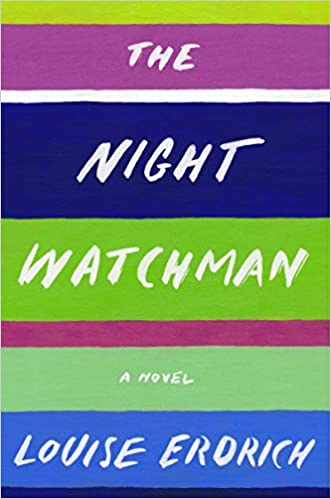 |
Canku Ota
|
 |
|
(Many Paths)
|
||
|
An Online Newsletter
Celebrating Native America
|
||
|
March 2020 - Volume
18 Number 3
|
||
|
|
||
|
Author Returns With
Powerful Tale Of Tribal Survival
|
||
|
by Ron Charles - The
Washington Post
|
||
Two years ago, Louise Erdrich thought she would never write again. The National Book Award-winning author of “The Round House” and more than a dozen other treasured novels had abandoned several manuscripts and given up. She was certain her “impetus had disintegrated.” Fortunately for us, she was wrong. One day, she woke from her depressed slumber impelled to read a cache of letters written in the middle of the 20th century by her grandfather, Patrick Gourneau. He had been chairman of the Turtle Mountain Band of Chippewa Advisory Committee during the tribe’s modern-day fight for survival. The threat at that time was legal, but it was as potentially disastrous as earlier assaults: In 1953, the U.S. House passed a resolution declaring that a number of tribes should be rapidly “freed from Federal supervision.” Ah, blessed freedom! Beneath that glorious promise of emancipation lurked the government’s true plan: the unilateral abrogation of treaties, the wholesale termination of tribes’ rights and the abandonment of Native Americans already impoverished by centuries of genocidal policies. Reminded of that dark era and her grandfather’s heroic role in saving the Turtle Mountain reservation in North Dakota, Erdrich knew she had found the inspiration for her next book. Erdrich’s career has been an act of resistance against racism — the hateful and the sentimental varieties — and the implacable force of white America’s ignorance. In one powerful book after another, she has carved Indians’ lives, histories and stories back into our national literature, a canon once determined to wipe them away. “The Night Watchman” is more overtly political — it even includes a trip to Washington, D.C. — but it’s a political novel reconceived as only Erdrich could. Although the legislative history and the congressional battles of Indian termination rumble over the horizon, the story stays focused on folks living on the Turtle Mountain reservation. For most of them, the immediate concerns of making a living, holding a family together and finding someone to love feel more pressing than the latest attack from a collection of white congressmen 1,500 miles away. But Thomas Wazhashk, the tribal leader at the center of this novel, understands the legislative danger early and fully. Thomas, a character based on Erdrich’s grandfather, works as a night watchman in a jewel bearing factory, the first manufacturing plant on the reservation. The hours are long, always lonely, sometimes spooky. As usual, modern realism and Native spirituality mingle harmoniously in Erdrich’s pages without calling either into question. Between making his rounds and contending with a ghost from his old boarding-school days, Thomas struggles to stay awake so that he can write letters to local and national politicians, business leaders, scholars —anyone who might help him mount an effective defense against Congress’ plans to terminate his tribe. “We have survived smallpox, the Winchester repeating rifle, the Hotchkiss gun, and tuberculosis,” Thomas thinks. “We have survived the flu epidemic of 1918, and fought in four or five deadly United States wars. But at last we will be destroyed by a collection of tedious words.” Not if he can help it. As Thomas toils away, drifting between lobbying and dreaming, the novel moves out into the community, capturing the lives of his friends and relatives. This tapestry of stories is a signature of Erdrich’s literary craft, but she does it so beautifully that it’s tempting to forget how remarkable it is. Chapter by chapter, we encounter characters interrelated but traveling along their own paths. There is Lloyd Barnes, a white man teaching math on the reservation, aware of his outsider status but not inhibited by it. He also runs a gym in the community center. His best former student is now his best boxer, a young man named Wood Mountain, who might be famous someday “if he could keep away from spirits.” Both coach and boxer are in love with the novel’s heroine, Patrice Paranteau, a smart, intimidatingly strong young woman who has no interest in either of them, thank you very much.
Erdrich weaves such charming romantic comedy from this situation, catching the anxious frustration of these suitors and Patrice’s withering disdain for them both. Although only 19, Patrice has more serious concerns on her mind. She is the breadwinner for her mother and little brother, and the main protector when her alcoholic father periodically crashes back home. Most alarming, her sister, Vera, headed off to Minneapolis months ago, and no one has heard anything from her. When her uncle perceives in a dream vision that Vera is in trouble, Patrice knows she must set out for the city to find her and bring her home. This adventure into a gritty urban underworld demonstrates how wide the borders of Erdrich’s narrative territory are. As a naive teenager who has never left the reservation, Patrice would seem an easy mark for crooks and pimps, but her quest for her sister thwarts our expectations. Scenes shift nimbly from weird comedy to unspeakable horror, somehow without diminishing either. At one point, Erdrich suggests that this is an essentially Chippewa attitude, “where the strangeness was also humorous and the danger surrounding this entire situation was of the sort that you might laugh at, even though you could also get hurt.” The survival of the Turtle Mountain reservation is a matter of historical record; the survival of Patrice and her sister is not guaranteed. Still, “The Night Watchman” has little interest in exploiting that suspense. This narrator’s vision is more capacious, reaching out across a whole community in tender conversation with itself. Expecting to follow the linear trajectory of a mystery, we discover in Erdrich’s fiction something more organic, more humane. Like her characters, we find ourselves “laughing in that desperate high-pitched way people laugh when their hearts are broken.” |
|||
|
|
|
|
||
|
|
||
| Canku Ota is a free Newsletter celebrating Native America, its traditions and accomplishments . We do not provide subscriber or visitor names to anyone. Some articles presented in Canku Ota may contain copyright material. We have received appropriate permissions for republishing any articles. Material appearing here is distributed without profit or monetary gain to those who have expressed an interest. This is in accordance with Title 17 U.S.C. Section 107. | ||
|
Canku Ota is a copyright ©
2000 - 2020 of Vicki Williams Barry and Paul Barry.
|
||
 |
 |
|
|
The "Canku
Ota - A Newsletter Celebrating Native America" web site and
its design is the
|
||
|
Copyright ©
1999 - 2020 of Paul C. Barry.
|
||
|
All Rights Reserved.
|
||

